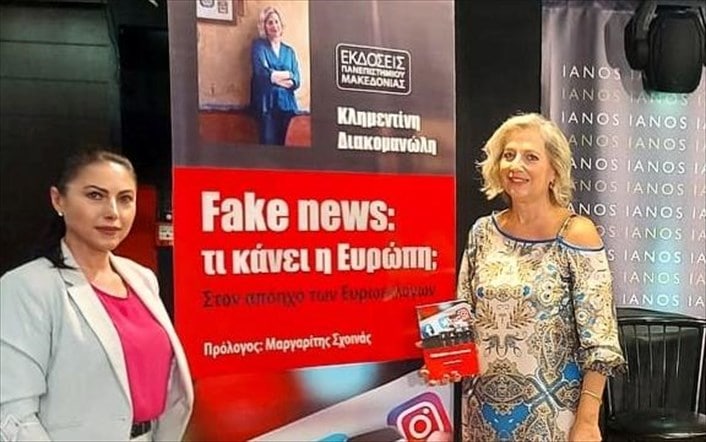The message that "in today's digital world we must protect our democracies from manipulation and deception" was sent by the Vice President of the European Commission Margaritis Schoinas, addressing by digital media (video) the presentation of the book of the Commission executive, Clementine Diakomanolis "Fake News - what is the EU doing? " at the Cyprus Writers' Union on Monday night in Nicosia, with strict observance of sanitary measures.
The Vice President of the Commission stated that Ms. Diakomanoli's book "is a step in the right direction". According to the Vice President, "the EU has achieved a lot" in the fight against fake news, "but often feels very alone".
As he said, "from 2018 onwards we focused on three axes: the sources of misinformation, the dispersal channels and the targets of malicious attacks. "We are now in a better position to detect and combat fake news, but there is still a long way to go to effectively defend our democracies."
For his part, the President of the Writers' Union, George Frangos, addressing the same event warned that "fake news is toxic to democracy and contaminates the information environment."
During his greeting, the former rector of the European University of Cyprus and Full Member of the European Academy of Sciences and Arts Dr. Costas Gouliamos stressed that "fake news is intensifying and expanding because we do not have time to chew on the news. The book irritates the reader especially in relation to the role that false news plays in the choice of our political behaviors ".
In a discussion with a large number of attending authors, the Lecturer at the Department of Journalism and Mass Media - University of Cyprus Dimitris Trimithiotis spoke about "a book with a very good structure, innovative elements and special clarity in writing to be accessible to ordinary users of social networks. "It contains a rich and multi-layered analysis of how the EU is trying to stem the tide of fake news."
For her part, Elli Kotzamani, Antenna Cyprus News Director and Chairman of the Cyprus Journalistic Ethics Committee, stressed that "the challenges in information have now changed, but the basic virtue of the press remains and remains its freedom." As he noted, "commentary is free but events are sacred" is a fixed and timeless principle of journalistic ethics.
"The voice of the opponents must be heard. Journalists and the media have an obligation to society. "In Cyprus at the moment, the competent bodies are just discussing the phenomenon of false news," he said. He stated that there is a great need for information, training and specialization of Cypriot journalists. "The Cypriot code of conduct for fake news needs to be modernized in the near future, but first journalists and the media need to be self-regulated," he said.
Finally, Costas Konstantinou, a journalist at Politis, noted that "this is a book-manual for fake news and the digital world" and added that "the need for quality journalism seems to be imperative, but also the responsibility of information professionals for proper and objective approach to news ".
The author herself, Klimentini Diakomanoli, in her own position stressed that "information is part of our life and in fact of our well-being. In a rapidly evolving digital world, the citizen has the responsibility of being informed. That's why he should be aware of the dangers of misinformation, so as not to be misled. We want to be the masters of his choices and not the big digital platforms that gain and grow from the attention and time we devote to them. "I hope this book provides an incentive for the reader to consciously use the good of information and freedom of expression."
The event was coordinated by the Head of the Press Office of the European Commission Delegation in Cyprus Athanasios Athanassiou.
(KYPE / AGK)
